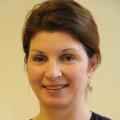TRIBUTES have been paid to a woman who did 'so many small things to make other people’s lives better'.
Eileen Ruston passed away at Arden House care home in Pickering on Wednesday, September, 18, aged 93.
A woman of many talents, Eileen helped set up Pickering's Beck Isle Museum along with her then husband, John, and the town's first playgroup.
Eileen was born in 1931 and spent her childhood in the small fishing and mining town of Newbiggin-by-the-sea in Northumberland.
Unusual for her time and background Eileen left Newbiggin to train as a nursery-nurse in Newcastle, she specialised for children with special needs. Once trained she then worked in Biker, the start of a lifetime of caring for the young.
Even more extraordinary, when given a sizeable tax rebate, she decided to use the money to apply to Camberwell college of Art. Talented as a painter, she was successful in getting a place and moved to London. She would later often speak of her years in London as exciting times, although she recalled, as one of very few female students, northern and working class, her male tutors expected her to paint only gritty dark landscapes.
In London she met John Rushton, whom she married in 1954 and moved into a flat together on the Fulham Road. Unfortunately, a sign of the times, she gave up studying, whereas her husband John continued at the LSE gaining his honours degree. Whilst living in Fulham they welcomed their first child Geraldine.
John got a job as a WEA organiser for Ryedale. After firstly considering Whitby - Eileen would have loved to be back living by the sea - the young couple decided on moving to Pickering, where Eileen was to live for 65 years. They set up home in an upstairs flat in Beck Isle, then home to Doctor Fletcher, where their second daughter Erika was born. After moving to a teacher’s council house in Springfield, their third and fourth children were born – Tom and Emma. A few years later Beck Isle became empty, and the couple set about making it into what became Beck Isle Museum of Rural Life.
Alongside setting up Beck Isle Museum, frustrated with the lack of provision for mothers with young children and for newcomers to the town, Eileen set up Pickering’s first playgroup in the Quaker Meeting house along with Mary Rowntree and Mrs Stone. curator of the meeting house, enterprising for the mid 1960s, this enabled women to chat and have support whilst their children played in a stimulating environment.
All her life Eileen continued to paint, as a real pleasure, not a chore, whenever she had time, and took to writing in her later decades, often about the Newbiggin of her childhood and the town’s people. She immersed herself in Pickering life, exhibited paintings in many Memorial Hall shows, attended calligraphy classes and drew with pastels, later making cards for her grandchildren and teaching them in turn craft and making skills.
Eileen found a part-time job working with a boy with special needs, work she was able to combine with her own children’s care. She worked with him over many years to teach him verbal skills and writing, self-care and some level of independence. She worked voluntarily from home, teaching people with leaning difficulties to read in the 1970s and 80s.
As her children left home, Eileen found time for full time work, at the old peoples care home at No5 Whitby Road, enjoying running the craft room with increasingly inventive ideas, and developing a new set of friends and colleagues and a new financial independence, enabling her to finally travel abroad.
Eileen was 70 when her and John divorced, never having set foot out of the UK previously, in the last 25 years of her life, she travelled to California, Sweden, The Netherlands, Germany, France, Australia and Croatia. She moved to a cottage on Castlegate, Pickering, which she loved, with a garden she had always desired, and was to tend it to become a beautiful cottage oasis which served her grandchildren and herself much pleasure over the 24 years she was there.
After her children left home Eileen took up tennis, 10-mile walks with friends on a Sunday, calligraphy, water colour classes, knit club and Scottish dancing, which she continued well into her 80’. With her many grandchildren and her arts and craft hobbies she had a full life, and a life filled with meaning and purpose. Eileen accepted everyone, whatever their background, so long as they were decent people.
Although her art career was cut short, due to the expectations placed on a woman of her time, and financial limitations of her class, perhaps her most original legacy, has been to pass on the skills and the love of making, of being creative. But perhaps her greatest legacy is the Eileen Rushton who did so many small things to make other people’s lives better, in the way a woman knows, and in the way that was accessible for a woman of her time. It is how she lived her life, a simple life in which she cared, one small act at a time.
Eileen is survived by three daughters, 8 grandchildren and 1 great grandchild.
In place of a funeral, a celebration of her life will be held at The Quaker Meeting House, from 1pm on Friday, October 25.












Comments: Our rules
We want our comments to be a lively and valuable part of our community - a place where readers can debate and engage with the most important local issues. The ability to comment on our stories is a privilege, not a right, however, and that privilege may be withdrawn if it is abused or misused.
Please report any comments that break our rules.
Read the rules here